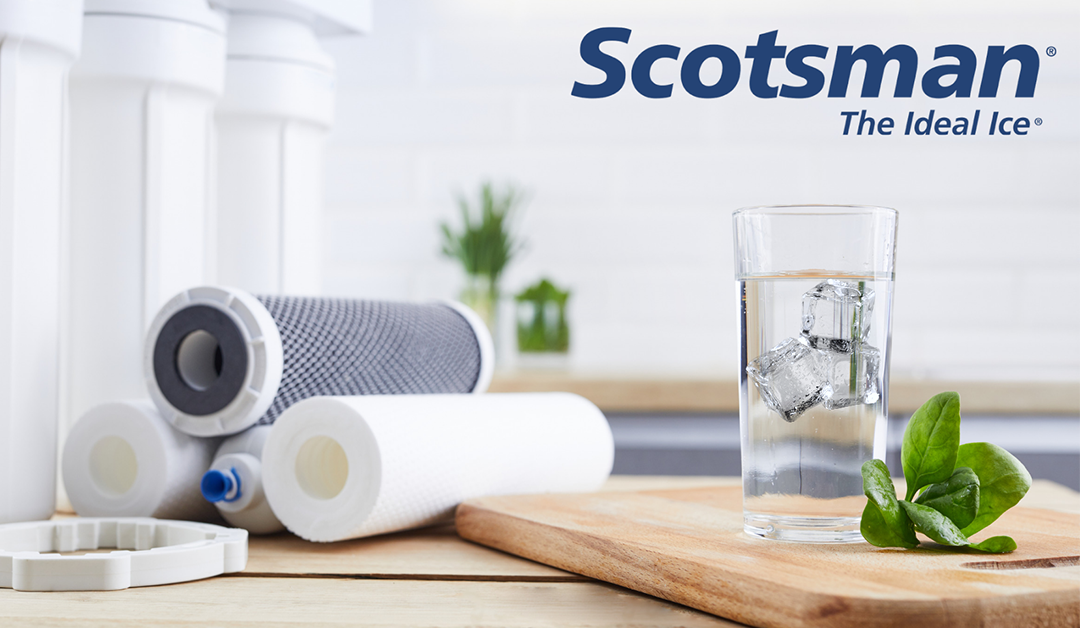Water Quality
All water, whether from the city treatment center or a well, contains impurities and minerals. These impurities and minerals are part of the groundwater system. They will then enter your home and can get trapped in your ice and affect the taste of your drinks and favorite recipes.
Some of the impurities, known as suspended solids, can be removed by a fine particle filter. Other impurities are chemically bonded to the water molecules, and cannot be filtered out, these are called dissolved solids.
To find the best water filter to remove impurities and minerals from your home, Scotsman suggests using a water test kit. Then you will be able to make the most informed decision on which water filtration system will best target what you’re up against.
Here are some impurities found in household water:
- Bacteria
- Microorganisms
- Viruses
- Nitrate
- Arsenic
- Chlorine
- Chromium
- Copper
- Fluoride
- Iron
- Aluminum
- Lead
Filters And Treatment
Now that you’ve identified the potential contaminants that can be found in your home water supply, you may want to filter the water before drinking. A proper water filtration system can remove these particles and help improve the purity and taste of your ice.
In order to best determine which filter is best for your home, it’s helpful to know how each filter works. Different types of water filtration systems use varying methods to remove contaminants:
- Reverse Osmosis: A reverse osmosis water filter forces water through a semi-permeable membrane. A reverse osmosis system should include post treatment to satisfy the R.O. water’s "aggressiveness."
- Infrared and Ultraviolet (UV) Light: Water is exposed to UV radiation, which destroy bacteria that could be potentially harmful.
- Carbon Absorption: Common in most home faucet filters. A carbon block filters larger particles out by absorbing sediment and silt.
- Mechanical: Mesh or Ceramic filters remove dirt, clay, sand and rust particles before they enter your home water system.
- Polyphosphate: Food grade polyphosphate is commonly used in scale inhibiting filters to sequester the calcium and magnesium. This does not result in the impurities being removed, it only prevents them from building up scale.
- Alkaline and Water Ionizers: Water passes over electrically charged plates, separating the alkaline water from the acidic water. Deionized water is not recommended. Because water softeners exchange one mineral for another, Scotsman does not recommend their use for ice machines. Where water is very hard, softened water may result in white, mushy cubes that stick together.
For your specific area of the country, you may want to contact the local point of use water specialist for recommendations on water treatment. Not every method of filtration will remove all contaminants to purify water.
Scotsman Machine Maintenance
Ice made by a Scotsman Brilliance Gourmet Cube ice machine will have a lower mineral content than the water it was made from. This is due to the method of making ice and the position of the evaporator. Purer water will freeze first on the ice makers evaporator. The reason for this is that anything dissolved in water lowers the water’s freezing temperature. This concentrates most of the impurities that make it through your home filtration system into the ice machine water reservoir and purged at the end of the ice making cycle.
Due to this, the water reservoir may form hard deposits known as scale. Eventually, built up mineral scale can shorten machine life. To keep the machine operating properly, these impurities or minerals will have to be regularly dissolved by an acid cleaning, using Scotsman Ice Machine Scale Remover. You can find a service partner near you to assist with this process or locate the products you need.
To view a step-by-step guide to cleaning your Scotsman Ice machine, click on your model below:
Find The Right Machine For Your Home
- For drive-thru quality ice at home, check out our BRILLIANCE® NUGGET ICE MACHINE.
- For crystal-clear, odorless ice cubes, check out our BRILLIANCE® CUBER MACHINES.
- To find a Scotsman dealer near you, search our Dealer Locator page.


